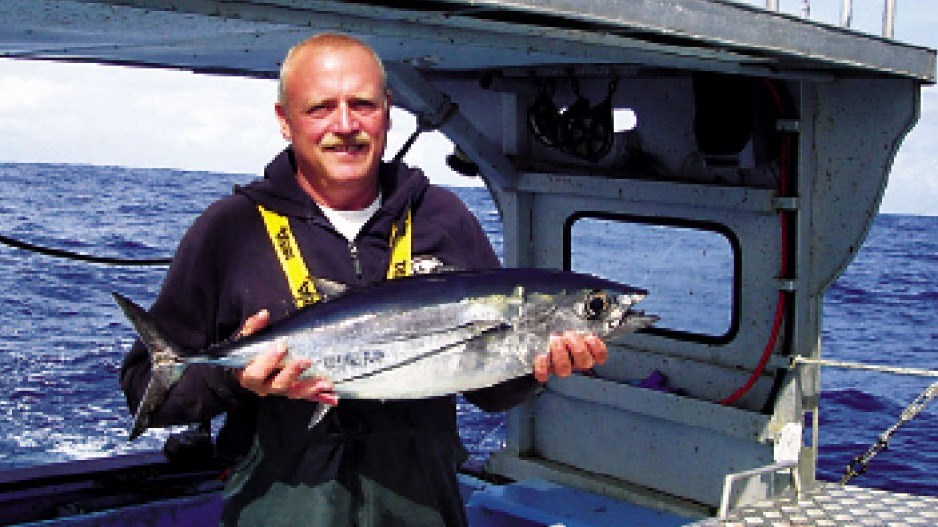BC tuna fishermen have been kicked out of the U.S. this year for operating too efficiently and, allegedly, using bullying tactics on the water to net big returns.
The U.S. indicated recently that the 110 Canadian albacore tuna boats that steam down the Pacific Coast every June will not be allowed south of the 49th parallel until an economic analysis is completed to determine the impact that Canada's harvesters are having on the fishery.
The Canada-U.S. Pacific Albacore Tuna Treaty is one of the few reciprocal access treaties in existence. It gives Canadian and U.S. fishermen access to each country's waters to chase the highly migratory tuna fish through the summer months.
The treaty has remained strong for more than 30 years, generating jobs and millions of dollars in economic activity on both sides of the border.
But, in recent years, the Canadian portion of the fishery has grown into a $30 million per year business, thanks to a marketing campaign that has broken into the Japanese sushi market.
Albacore tuna prices have increased 20% to 25% in recent years as the fish continues to generate buzz for its flavour and sustainable reputation. (See "Tuna trade floats on sustainable success" – issue 1130; June 21-27, 2011.)
The terms of the current fishing regime under the treaty expired last October, providing U.S. fishermen the opportunity to renegotiate Canada's access to their waters to harvest a fish that's increasingly found south of the border.
"This will have a huge impact on the Canadian albacore fishery," said Ian Bryce, a Port Alberni-based tuna fisherman whose boat generates enough income to support four families.
"The American fishermen have a number of complaints, one of which is that Canadians are more efficient … they feel like they're getting pushed around on their own ground," Bryce said. "These are all issues we have been aware of for some time … and we're quite prepared to sit down and talk about [them] at the treaty table."
But the Americans have left the negotiating table.
Wayne Heikkila, executive director of the Western Fishboat Owners Association (WFBOA) out of Redding, California, said it's time for fishermen on both sides of the border to take a "breather" for a year and re-think how the fishing regime should be set up.
"The treaty served itself real well until the late 1990s when the Canadian fleet started expanding quite a bit, mainly because guys were getting displaced from other fisheries," said Heikkila. "That started creating problems on the ground. The fish generally hang in tight areas in the summer months. The boats get congested.
"When certain guys get crowded they're going to look at who's around them; Canadians are an easy target."
He added that Canadian fishermen have become increasingly aggressive in U.S. waters in recent years, sometimes crowding their southern counterparts, resulting in verbal altercations between boats.
Both the WFBOA and the American Albacore Fishing Association have turned against Canadian fishermen. Last month, the Oregon-based Pacific Fishery Management Council said the crowding of U.S. boats by Canadians has created "an unhealthy situation" south of the border.
"The council believes that the Canadian catch has increased substantially, and much more of the Canadian catch is delivered back to Canadian ports instead of U.S. ports," Don McIsaac, executive director of the council, wrote in a letter to the U.S. National Marine Fisheries Service last month. "This suggests that Canada is gaining a disproportionate benefit from the treaty compared to the U.S."
But McIsaac added that more information is needed to substantiate that view.
Bryce, however, said U.S. fishermen might have shot themselves in the foot when they walked away from the treaty table.
After all, a shift in ocean temperatures or currents could mean that more tuna will be found in Canadian waters this year than U.S. waters at a time when the Americans have abandoned access to B.C.
On top of that, the Canadian Highly Migratory Species Foundation estimates that the presence of Canadian fishermen in U.S. waters generates between $4 million and $16 million annually in vessel expenditures and sales revenue to processors in coastal American communities.
Despite the setback, Bryce said his business will likely stay afloat this year because he can still fish for tuna in B.C. and has a licence to troll for salmon.
Fisheries and Oceans Canada, meantime, said it's working to resolve the conflict.
"We understand and share the Canadian industry's concerns about maintaining access for 2012," said Fisheries spokeswoman Melanie Carkner. "We will continue to take every opportunity through diplomatic channels to address the matter with our U.S. counterparts." •




